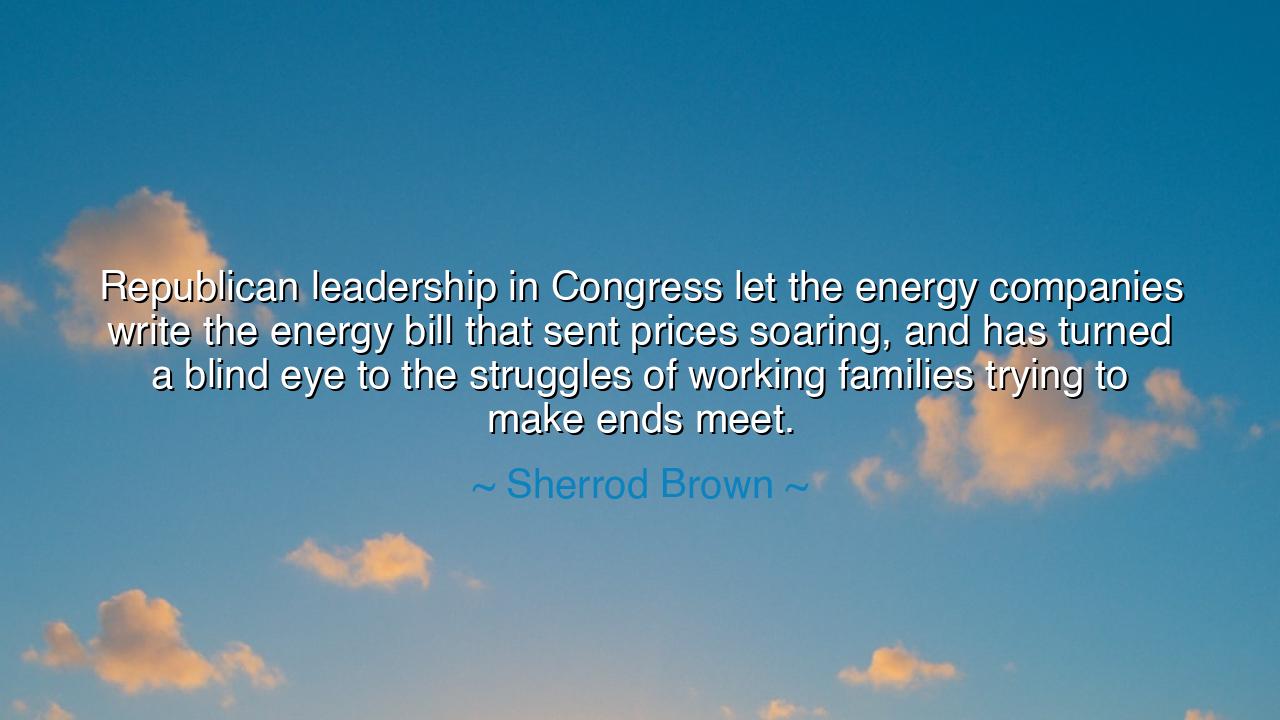
Republican leadership in Congress let the energy companies write
Republican leadership in Congress let the energy companies write the energy bill that sent prices soaring, and has turned a blind eye to the struggles of working families trying to make ends meet.






When Sherrod Brown declared, “Republican leadership in Congress let the energy companies write the energy bill that sent prices soaring, and has turned a blind eye to the struggles of working families trying to make ends meet,” he was not merely criticizing a piece of legislation. He was calling attention to an ancient and recurring failure of governance — the betrayal of the common good for the sake of power and profit. His words carry the weight of moral outrage, spoken in defense of those whose voices are too often drowned out by the wealth and influence of the mighty. Beneath this political statement lies a universal truth: when leaders serve gold instead of justice, the people suffer.
The origin of this quote lies in the early 2000s, during a period of rising energy prices and growing frustration among working-class Americans. Senator Sherrod Brown, known for his populist convictions, denounced what he saw as the capture of public policy by private interests — in this case, energy corporations that had used their wealth and lobbying power to shape laws in their favor. His statement reflects the age-old struggle between the governed and the powerful, between those who labor for a living and those who profit from their labor. It is not a partisan cry, but a plea for ethical leadership — for the remembrance that governance, at its best, is a sacred trust, not a marketplace of favors.
In the style of the ancients, Brown’s words recall the lessons of philosophers and prophets who warned that corruption of the state begins not with invasion or rebellion, but with moral decay within its leaders. The Athenian statesman Solon once said that the downfall of cities begins when the powerful forget moderation and the rulers cease to serve the ruled. So too did the prophets of Israel cry out against kings who “trample the poor and sell the needy for a pair of sandals.” Brown’s accusation that Congress “turned a blind eye” to the struggles of the people echoes these ancient voices — a lament that those entrusted with justice have chosen comfort over courage.
History provides countless mirrors to this truth. Consider the Gilded Age of the late nineteenth century, when great industrial barons in America — the oil tycoons, railroad magnates, and financiers — wielded such power that they shaped laws and crushed competition at will. The government, weakened by greed and complacency, became a servant of its wealthiest citizens rather than its most vulnerable. It took the outcry of reformers and the courage of leaders like Theodore Roosevelt to begin restoring balance, to remind the nation that the economy must serve humanity, not the reverse. In every age, the cycle repeats: when power grows too close to profit, the people must rise to demand integrity.
Yet Brown’s words do more than condemn — they warn and instruct. His lament is not merely about fuel prices or legislative failure; it is about the erosion of empathy in leadership. To “turn a blind eye” is to lose the moral vision that makes governance noble. A leader who cannot see the struggle of the people has ceased to lead — he merely presides. Brown calls us back to the ancient principle that leadership is stewardship, not ownership. The wealth of a nation is not measured in the riches of its elite, but in the dignity and security of its citizens.
There is also in this quote an appeal to ordinary people — a reminder that the responsibility for justice belongs to all. The ancients taught that when rulers grow corrupt, it is because the people have grown complacent. The Roman historian Tacitus wrote that “the more corrupt the state, the more laws it has,” meaning that when conscience fails, regulation multiplies but morality fades. Brown’s challenge to the people is to remain vigilant, to hold power accountable, and to remember that democracy dies not in violence, but in indifference.
So let this teaching be passed down: a government that forgets its people loses its soul. When policy becomes the plaything of the powerful, when wealth replaces wisdom, and when empathy is silenced by influence, the nation stands on the brink of decay. Yet hope endures — for every age has its reformers, its truth-tellers, its guardians of conscience. Let each person, then, take up that ancient duty: to speak for the voiceless, to demand fairness where greed has taken root, and to remember that leadership — in every form — must always serve the common good over private gain. For when justice guides policy and compassion tempers power, the people prosper, and the republic is made strong again.






AAdministratorAdministrator
Welcome, honored guests. Please leave a comment, we will respond soon